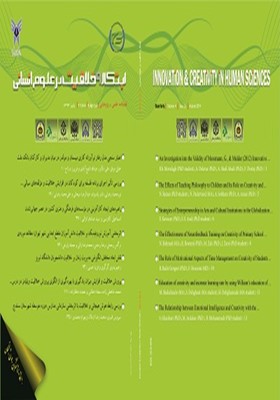راهبردهای ایجاد کارآفرینی در مؤسسههای فرهنگی و هنری کشور در عصر جهانیشدن
محورهای موضوعی : خلاقیت و نوآوری از جنبه‏های روان‏شناختی، علوم شناختی، علوم تربیتی و آموزشی (خلاقیت شناسی روان‏شناختی، خلاقیت شناسی پرورشی)اسماعیل کاوسی 1 * , سید صادق اوالی 2
1 - عضو هیئتعلمی و دانشیار دانشگاه آزاد اسلامی واحد تهران شمال ، تهران، ایران (نویسندة مسئول) ekavousy@yahoo.com
2 - دانشجوی دکتری مدیریت فرهنگی دانشگاه آزاد اسلامی واحد علوم و تحقیقات تهران
کلید واژه: راهبرد, کارآفرینی, جهانیشدن, مؤسسههای فرهنگی و هنری,
چکیده مقاله :
زمینه: جهانیشدن ازجمله مفاهیم کلیدی است که در دهههای گذشته موردتوجه ویژه اندیشمندان و سیاستگذاران بوده است، بهطوریکه این مفهوم را میتوان یکی از متداولترین و پراستفادهترین مفاهیم علوم انسانی دانست که با گذشت زمان افقهای جدیدی از آن آشکار میشود. رشد سریع و تکاملی دانش فنی و فنّاوری و گسترش بازار مصرف، مجال استفاده از تجارب و راهحلهای گذشته را از آدمی ربوده است. بهطوریکه این تجارب و راهحلها برای مسائل جاری و آینده سازمانها کارگشا نیستند. هدف: این تحقیق به دنبال بررسی راهبردهای ایجاد کارآفرینی در مؤسسههای فرهنگی و هنری کشور در عصر جهانیشدن است. روش پژوهش: پژوهش حاضر از منظر هدف، کاربردی و ازنظر نحوة گردآوری دادهها (طرح تحقیق) آمیخته اکتشافی به شمار میرود. در مرحله کیفی دادهها با روش مطالعة موردی گردآوری شد و در مرحله کمّی گردآوری دادهها توصیفی از نوع پیمایشی است. جامعة آماری این تحقیق شامل 400 نفر از خبرگان دانشگاهی و صاحبنظران حوزهٔ فرهنگ و هنر، مدیران و کارشناسان مؤسسات فرهنگی، هنری و کارآفرینان فرهنگی است. در مرحله کیفی از روش نمونهگیری هدفمند استفاده شد. در مرحله کمّی نیز از روش نمونهگیری هدفمند قضاوتی استفاده شد. با توجه به فرمول کوکران، حجم نمونه برابر 250 نفر است. تعداد 275 پرسشنامه با احتساب ده درصد بیشتر از حجم نمونه بین افراد توزیع شد. یافتهها: بر اساس اطلاعات حاصل از مصاحبه و پرسشنامه به تدوین ارزشهای بنیادی، مأموریتهای کسبوکارهای فرهنگی و استخراج عوامل محیط داخلی و خارجی پرداخته شد. نتیجهگیری: با استفاده از چارچوب اِسدبلیواوتی[1] و ماتریس کیواِسامپی[2]، راهبردهای ایجاد کارآفرینی در مؤسسههای فرهنگی و هنری کشور در عصر جهانیشدن استخراج شد.
Background: Globalization is one of the key concepts which, in recent decades, has received much attention among scholars and policy makers, to the extent that this concept can be called one of the most popular and most used concepts in the humanities. With the rapid and increasing growth of technical know-how, technology and consumer markets, there would be no room for using the past and established experiences and solutions. Past experiences and solutions are no longer useful for current and future problems of organizations. Objective: This research reviewed the strategies of entrepreneurship in arts and cultural institutions in the era of globalization. Method: It is functional in terms of purpose, and in terms of data collection (research plan) it is heuristic mixed. In the qualitative step, the case study approach was applied for data collection, and in the quantitative step, the data collection was done by survey description method. The population consisted of academic experts and experts in the field of art and culture, executives, experts in cultural and arts institutions and cultural entrepreneurs. In the qualitative step, using purposive sampling, samples were taken to saturation level. After interviewing some 14 experts, data was reached to saturation. In quantitative step, judgmental purposive sampling was used, which is considered as non-probability sampling methods. Statistical population size of executives, professionals and entrepreneurs in the arts and culture sector was about 400 people which after having been put in the Cochran formula, some 250 samples were obtained. Some 275 questionnaires and counting a ten-percent greater than selected sample size were distributed. Findings / Result: The information obtained from interviews and questionnaires helped to develop basic values, cultural business missions as well as finding inner and outer factors. Conclusion: Using the SWOT and QSMP matrix, strategies to entrepreneurship in arts and culture institutions in the era of globalization were designed.

